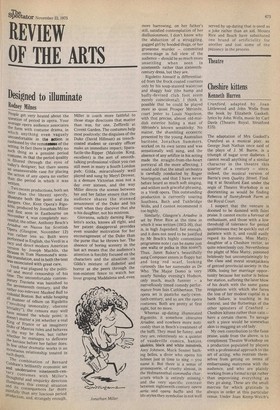Designed to illuminate
Rodney Milnes
question of period in opera. Your average opera audience associates People get very heated about the
today's designer; but there seems the action of any opera no earlier Which anything even vaguely cushioned by the remotaliMis of the such thing as a genuine period costume, in that the period quality is filtered through the eyes of an unanswerable case for placing the form with costume drama, in uncomfortable in the action is setting. In fact there is probably no than the period in which it was written.
Two recent productions, both set later than the libretti specify, illustrate both the point and its dangers. One, Kent Opera's Rigoletto, produced by Jonathan Miller and first seen in Eastbourne on November 4, was completely successful; the other, Anthony Besch's Ariadne on Naxos for Scottish 'Opera (Glasgow, November 12) was rather less so. Both were Performed in English, the Verdi in a racy and direct modern American version by Joseph Machlis, the Strauss in Tom Hammond's sensible translation, and in both the text was enunciated with great care. Verdi was plagued by the political and moral censorship of his time The uncomfortable contemPorary Traviata was banished to the seventeenth century, and the rather-too-relevant Mashed Ball to colonial Boston. But while heaping all manner of odium on Rigoletto ("revolting immorality, obscene triviality"), the censors may well have missed the whole point; it doesn't matter a jot whether a real King of France or an imaginery Duke of Mantua rules and behaves in the way he does, but rather Whether he manages to deflower the heroine before her father does.
few other dramatic works is an Incestuous relationship treated in such depth.
e The combination of Bernard Celshaw's brilliantly economic set and unobtrusive nineteenth-cenjury costumes with Miller's thoughtful and unquirky direction illuminates this central situation and its consequences ear more Painfully than any luscious period Production, and, strangely enough.
Miller is ',web more faithful to those stage directions that matter than was, for one, Zeffirelli at Covent Garden. The costumes help most positively; the disguises of the Duke (David Hillman) as trenchcoated student or cavalry officer make an immediate impact; Sparefucile-the-Ripper (Malcolm King, excellent) is the sort of smooth talking professional villain you can still meet in many a South London pub; Gilda, miraculously well played and sung by Meryl Drower, is a demure Victorian miss not a day over sixteen, and the way Miller directs the scenes between her and her father ensure that the audience shares the stunned amazement of the Duke and his court when they discover that she is his daughter, not his mistress.
Giovanna, sulkily darning Rigoletto's socks, knows all right, and her patent disapproval provides even sounder motivation for her encouragement of the Duke than the purse that he throws her. The absence of boring scenery in the last act means that the audience's attention is forcibly focused on the characters and the situation: on Gilda's mixture of disbelief and horror as she peers through the non-existent fence to watch her lover groping Maddalena and, even more harrowing, on her father's still, satisfied contemplation of her disillusionment. I don't know why the abduction of a struggling, gagged girl by hooded thugs, or her gruesome murder — committed centre-stage in full view of the audience — should be so much more unsettling when seen in nineteenthrather than sixteenthcentury dress, but they are.
Rigoletto himself is differentiated from the frock-coated courtiers only by his soup-stained waistcoat and shaggy hair (the hump and badly-devised club foot seem merely coincidental). I think it possible that he could be played more as quasi Prosper Merimee, court jester to Louis Napoleon, with that precise, almost old-maidish exterior hiding a man of Merimee's known sensitivity. No matter, the shambling eccentric presented by the young Australian baritone, Jonathan Summers, worked on its own terms and was sensationally well sung, and the absence of any artifice in his acting made the straight-from-the-heart portrayal all the more affecting. I would add that the small orchestra is carefully conducted by Roger Norrington, and that I have never before heard so much soft singing, and seldom such graceful phrasing, in a Verdi opera. This outstanding production is currently touring Southsea, Bath and Tunbridge Wells, and I cannot recommend it too highly.
Similarly, Glasgow's Ariadne is set by Peter Rice at the time in which it was written (1912-16), that is, in high Jugendstil: fair enough, and it does not need to be justified by Mr Besch's highly contentious programme note ( can he name just one waltz or polka in this score?). Thus, Janet Baker's beautifully sung Composer enters in floppy hat and long red scarf, looking 'curiously like her namesake as Dr Who. The Major Domo is very nearly Sunday evening's Hudson, only much, much funnier — a mervellously timed comedy performance from lain Cuthbertson. The opera set is pastiche early-twentieth-century, and so are the opera costumes. Both are pretty at first sight, but no more.
Whereas up-dating illuminated Rigoletto. it somehow obscures Ariadne. and nowhere more noticeably than in Besch's treatment of the buffi. They must be funny, and they are, relentlessly so: a quintet of vaudeville comics, banjos, ukeleles, black and white minstrels, Amy Johnson, Mack Sennet bathing belles, a diver who opens his helmet just in time to sing — you name it. But there is a sense of grotesquerie, of cruelty almost, in the Hofmannsthal commedia characters which is entirely missing. and the very specific contrast between eighteenth-century opera seria and opera buffa and the life-styles they symbolise is not well
served by up-dating that is used as a joke rather than an aid. Messrs Rice and Besch have substituted one brand of artificiality for another and lost some of the piquancy in the process.
































 Previous page
Previous page